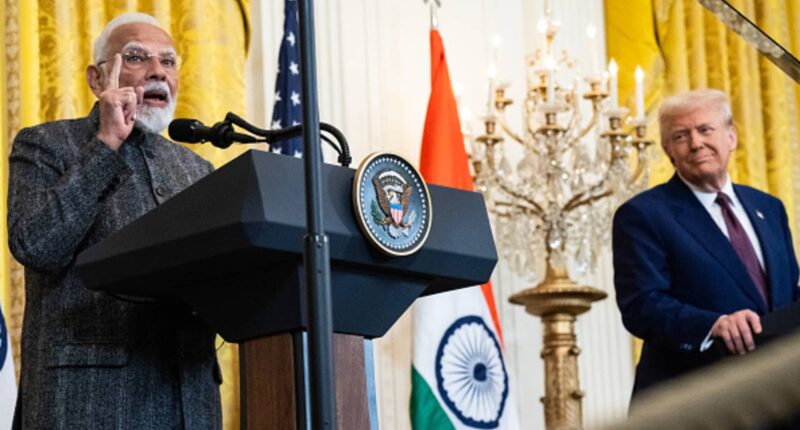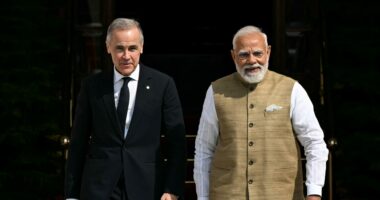Share this @internewscast.com
In the midst of the shimmering Gulf waters, the Indian oil tanker Desh Ujaala was spotted near the Al-Basrah Oil Terminal, situated approximately 50 kilometers off the southern Faw peninsula of Iraq, on August 5, 2025. This image, captured by Hussein Faleh and distributed by AFP via Getty Images, represents a significant moment in global oil trade dynamics.
On Wednesday, U.S. President Donald Trump announced a notable shift in international relations by stating that Indian Prime Minister Narendra Modi has committed to ceasing India’s purchase of oil from Russia. However, Trump cautioned that this transition would take time to fully implement.
During a press briefing in the Oval Office, President Trump expressed his satisfaction with Modi’s assurance, noting, “He assured me today that they will not be buying oil from Russia. That’s a big stop.” Trump emphasized the importance of this decision, highlighting its potential impact on Russia’s ability to sustain its “ridiculous war” in Ukraine.
While expressing optimism about India’s decision, Trump also acknowledged that the cessation of Russian oil imports by India would not happen overnight. He mentioned that the process would take time, though he did not specify an exact timeline for this transition. Furthermore, the President hinted at the broader geopolitical implications, suggesting that persuading China to follow a similar path would be a subsequent goal.
He added that Washington was unhappy with New Delhi’s purchases of Russian crude because it allowed Moscow to continue waging its “ridiculous war” in Ukraine.
However, the U.S. president also said that the halt will not be immediate, and there will be “a little bit of a process,” without giving a clear timeline.
India’s external affairs ministry said Friday that the country’s oil import decisions are driven by efforts to protect consumers by ensuring stable energy prices and securing supplies.
The ministry’s priority was to “safeguard the interests of the Indian consumer in a volatile energy scenario,” External Affairs Ministry spokesperson Randhir Jaiswal said in a statement.
He added that India’s import policies are guided “entirely” by that goal.
Jaiswal said that India has sought for years to expand energy trade with the U.S. “This has steadily progressed in the last decade,” he said, adding that “the current Administration has shown interest in deepening energy cooperation with India. Discussions are ongoing.”
India and Russian crude
India’s imports of Russian oil have been a sticking point in the relationship between Washington and New Delhi. Trump slapped additional tariffs of 25% on India back in August, raising the total levy to 50%, while India has called out the U.S. for its trade with Russia.
“If India doesn’t buy [Russian] oil, it makes [ending the war] much easier,” Trump said. “They assured me within a short period of time, they will not be buying oil from Russia, and they will go back to Russia after the war is over.”
On Thursday, Brent crude futures climbed 0.82% to $62.43 a barrel by 10:31 p.m. ET, while U.S. West Texas Intermediate futures climbed 0.89% to $58.79.
India is one of the biggest buyers of Russian oil. Data from research firm Kpler shows Russia exports about 3.35 million barrels of crude per day, with India taking about 1.7 million and China 1.1 million.
New Delhi has defended those purchases, with Energy Minister Hardeep Singh Puri telling CNBC in July that New Delhi helped stabilize global energy prices and was encouraged by the U.S. to do so.
“If people or countries had stopped buying at that stage, the price of oil would have gone up to 130 dollars a barrel. That was a situation in which we were advised, including by our friends in the United States, to please buy Russian oil, but within the price cap,” Puri said.
Russian sales of crude oil have been placed under a price cap by the G7 nations and the European Union since Moscow’s 2022 invasion of Ukraine.
That price cap, set at $47.6 per barrel, aims to limit Moscow’s revenue from oil exports, constricting the country’s ability to finance its war in Ukraine.








